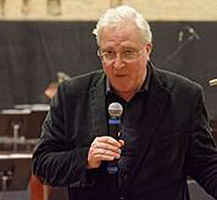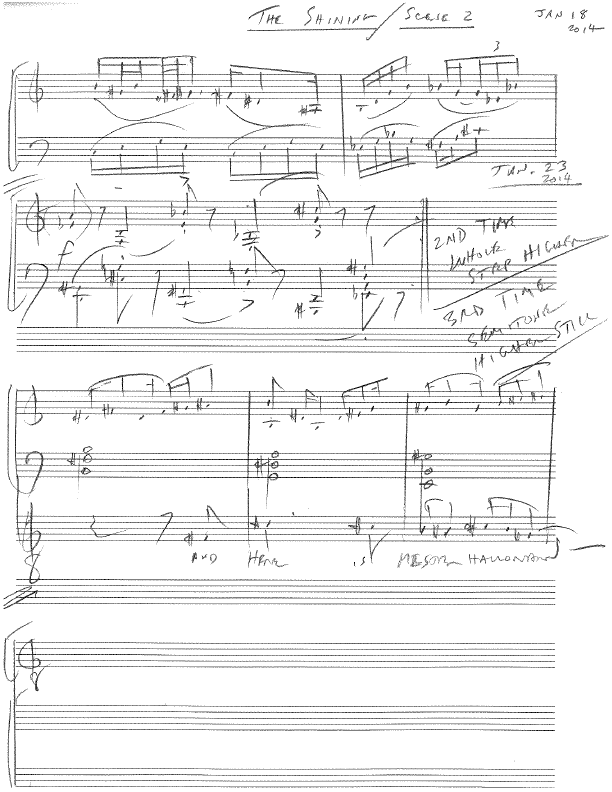The Composer's Note
Paul Moravec
 Stephen King’s novel The Shining is naturally operatic: it sings. The story concerns three of the basic elements of opera: love, death, and power. More specifically, it’s about the power of love in the presence of terrible evil and destructive forces. For all of the action, the horror, the ghosts, and the ominous Overlook Hotel, it’s a heart-breaking story about a family trying to stay together under extraordinary duress. It was a joy for me and the librettist Mark Campbell to imagine this eternal conflict in musically dramatic form, along with the novel’s evocation of terror and the supernatural.
Stephen King’s novel The Shining is naturally operatic: it sings. The story concerns three of the basic elements of opera: love, death, and power. More specifically, it’s about the power of love in the presence of terrible evil and destructive forces. For all of the action, the horror, the ghosts, and the ominous Overlook Hotel, it’s a heart-breaking story about a family trying to stay together under extraordinary duress. It was a joy for me and the librettist Mark Campbell to imagine this eternal conflict in musically dramatic form, along with the novel’s evocation of terror and the supernatural.
From the get-go in our collaboration, Mark and I agreed on the importance of focusing on the musicalization of Jack Torrance as a flesh-and-blood, three-dimensional character. Much of the music in the opera, including the orchestral interludes, works to get the audience inside Jack’s mind and central nervous system so that we can feel the transformation of a basically decent guy trying to do the right thing as he is overwhelmed by madness and evil. Unlike Wendy Torrance and Dick Hallorann, Jack does not have a full-length, self-contained solo aria anywhere in the score. Jack sings throughout (in a sense the entire opera is his aria); however, his vocal line is structurally fragmented.
"…Armed with Stephen King’s 1977 bestselling novel [as its] rich source material, Moravec proves to be a masterful musical dramatist…"
— OperaNews
Click to enlarge image
In my view, one of the operatic aspects of King’s novel is the presence of resonant archetypes. Whether consciously or not, one of those archetypes is the Dr-Jekyll-and-Mr-Hyde story: Jack Torrance is genuinely conflicted. Jack’s relationship to his son Danny also reminded me of the Abraham-and-Isaac story. As with Abraham, Jack faces an intolerable dilemma: a higher, supernatural force (in this case, the ghosts of Delbert Grady and Horace Derwent) is commanding Jack, the Overlook caretaker, to sacrifice his son. This command, of course, runs directly counter to his feelings and obligations as a father.
For all of the complexity and sophistication of opera, and the convergence of exciting drama with beautiful music, opera’s power as an art-form springs from its essentially primordial, irrational nature. It’s ideally suited to the adaptation of Mr. King’s irresistibly compelling story. (Printed Vocal Score coming soon.)
